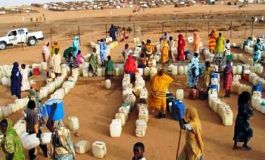Aid workers access to people in Darfur diminishing
March 19, 2007 (UNITED NATIONS) — Humanitarian access is shrinking rapidly in Darfur where relief workers are attacked and intimidated, a U.N. humanitarian official said shortly before making his first trip to the region on Tuesday.
 Briton John Holmes, the humanitarian and emergency relief coordinator who took up his post this month, plans to go to Khartoum, Juba in the south and Darfur in the west. His 10-day tour takes him to Chad and the Central African Republic, which have borne spillovers from the conflict in Darfur.
Briton John Holmes, the humanitarian and emergency relief coordinator who took up his post this month, plans to go to Khartoum, Juba in the south and Darfur in the west. His 10-day tour takes him to Chad and the Central African Republic, which have borne spillovers from the conflict in Darfur.
Holmes said in an interview with two reporters that aid workers were barred from many areas “more or less all the time” sometimes because of government operations, other times by rebel fighters.
In July 2005, international relief workers were able to reach some 90 percent of civilians in need. Now this is reduced to 64 percent, U.N. figures show.
The Darfur conflict began in early 2003 when African rebels took up arms, accusing the government of neglect. Khartoum then armed brutal militia known as Janjaweed, who murdered, pillaged and raped civilians. Now rebel groups, split into factions, are committing their own atrocities.
There have been “quite a lot of attacks from everyone” and “no one is innocent” whether the rebels, the government, the Janjaweed or bandits, Holmes said.
Some 4 million people have been uprooted because of the conflict, up from 1.08 million in April 2004. At least 200,000 have fled to impoverished Chad.
Holmes said he hoped for cooperation from the Khartoum government, including expediting and extending visas and getting supplies out of customs — as well as security of the aid workers themselves, now numbering some 13,000 and spending about $1 billion annually.
“It is the responsibility of the government or whoever is in control in any particular area to protect the humanitarian workers who are looking after the people,” Holmes said.
PEACEKEEPERS?
The United Nations has offered peacekeepers to help Sudan protect civilians and bolster a 7,000-strong African Union force in Darfur protect civilians, some 2.5 million of them living in arid camps, but Khartoum has refused.
Jean-Marie Guehenno, head of U.N. peacekeeping, said the United Nations would not accept a rejection by President Omar Hassan al-Bashir because too many people were suffering in Sudan, Chad, the Central African Republic and even Cameroon.
“We’ll never take any reaction as a rejection,” Guehenno said after Security Council consultations. “We can’t afford that and the people in Darfur can’t afford that.”
Diplomats said the 15-member council was divided with even South Africa sympathetic to Sudan’s delay while Britain and the United States want sanctions.
In a letter last week Bashir refused to accept U.N. plans for an interim plan of 3,000 personnel that would lead to a large force of more than 20,000 military and police, asking for more talks.
Senior U.N. officials have made nine trips to Khartoum on this issue, Guehenno said. “We believe that we have waited much too long, that the situation on the ground requires urgent action.”
Guehenno said all sides need to sit down and calmly look at the facts of the dire situation in Darfur “because if you do not agree on the situation it’s very difficult to agree on the remedy.”
“We strongly believe that what is needed is a solid political process, but also a solid peacekeeping presence and that without that the suffering will continue,” Guehenno said.
(Reuters)
